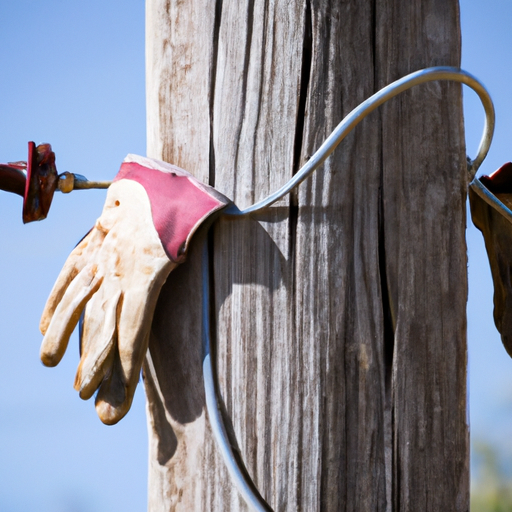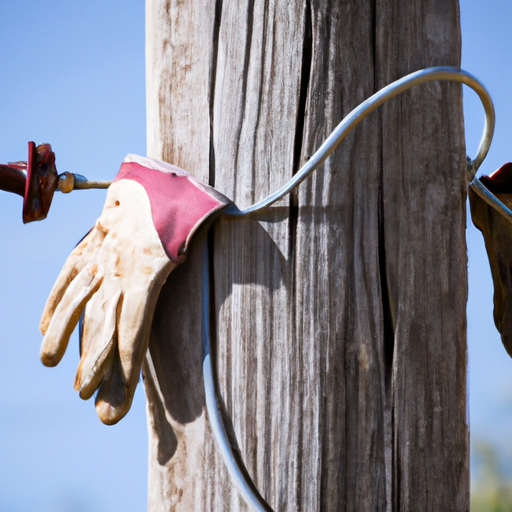In this article, you will learn about the role of a lineman apprentice and what they do. A lineman apprentice is someone who is training to become a lineman, which is a skilled worker who installs and maintains power lines.
As a lineman apprentice, you will work under the supervision of an experienced lineman and learn the necessary skills and knowledge to eventually become a fully qualified lineman. This article will delve into the responsibilities and duties of a lineman apprentice, as well as the training and qualifications required for this role.
A lineman apprentice is an individual who undergoes training to become a skilled professional in the field of electrical power systems. Linemen play a crucial role in maintaining and repairing overhead and underground power lines, ensuring the uninterrupted flow of electricity to homes, businesses, and industries. In this article, we will explore the definition, training and education required, role and responsibilities, as well as the importance and career prospects of a lineman apprentice.

What is a lineman apprentice?
Definition
A lineman apprentice is a person who works under the mentorship and guidance of experienced linemen to acquire the necessary skills and knowledge in the field of power line installation, repair, and maintenance. Apprenticeships typically involve a combination of on-the-job training and classroom instruction, allowing individuals to gain practical experience while learning the theoretical aspects of the trade.
Training and Education
To become a lineman apprentice, individuals are required to have a high school diploma or equivalent. While a formal college degree is not mandatory, some technical schools and community colleges offer programs related to power line installation and repair. These programs can provide valuable knowledge of electrical systems, safety practices, and industry standards.
Additionally, aspiring lineman apprentices can benefit from vocational training centres and trade schools that specifically cater to those interested in pursuing a career in the electrical industry. These institutions offer specialized courses that focus on the technical skills required for the job, such as pole climbing, bucket truck operation, and the use of specialized tools.
Role and responsibilities
The primary responsibility of a lineman apprentice is to support and assist experienced linemen in the installation, repair, and maintenance of power distribution systems. This includes working on overhead power lines, underground cables, and various electrical equipment.
Lineman apprentices are responsible for tasks such as setting up and removing utility poles, stringing and splicing power lines, installing transformers and insulators, and conducting routine inspections to identify potential issues or hazards. They work closely with their mentors to learn proper safety procedures, troubleshoot electrical problems, and acquire the necessary skills to work independently.
Importance of lineman apprentices
Maintaining power infrastructure
The role of a lineman apprentice is crucial in ensuring the smooth operation of power infrastructure. Linemen are responsible for the construction and maintenance of power lines that deliver electricity to homes, businesses, hospitals, and other essential facilities. Without their expertise, power outages would be more frequent and prolonged, severely impacting modern life.
Ensuring public safety
Safety is a top priority in the electrical industry, and linemen play a critical role in ensuring public safety. By inspecting power lines, identifying potential hazards, and conducting repairs and maintenance, lineman apprentices help prevent accidents, blackouts, and fires caused by electrical faults. Their work contributes to the overall well-being of communities and the protection of individuals from electrical hazards.
Skills required for a lineman apprentice
Physical fitness
Working as a lineman requires excellent physical fitness and strength. Lineman apprentices must be able to climb utility poles, carry heavy equipment, and work at heights for extended periods. They need to maintain their physical endurance and agility to perform their duties safely and effectively.
Technical knowledge
Lineman apprentices need to develop a solid understanding of electrical systems, power line construction techniques, and safety protocols. They must be knowledgeable about the different types of electrical cables, connectors, and insulators and be able to troubleshoot and repair issues efficiently. Keeping up with the latest industry standards and technological advancements is also essential for a lineman apprentice.
Problem-solving abilities
As a lineman apprentice, you will encounter various challenges and obstacles that require strong problem-solving skills. Whether it’s finding the cause of a power outage or resolving a technical issue in a power distribution system, lineman apprentices must be able to think critically and come up with effective solutions in a timely manner.

Steps to become a lineman apprentice
Research and preparation
Before pursuing a career as a lineman apprentice, it is essential to research and gather information about the industry and available apprenticeship programs in your area. You can reach out to local utility companies, electrical contractors, or trade organizations to learn about their requirements and application processes.
Apprenticeship programs
Once you have identified potential apprenticeship programs, you can apply and complete the selection process, which may involve interviews and assessments. Apprenticeship programs typically last between three and five years, during which you will work under the guidance and supervision of experienced linemen.
During your apprenticeship, you will gain hands-on experience, develop technical skills, and attend classroom instruction to learn the theoretical aspects of the trade. It is important to take full advantage of this learning opportunity and actively participate in all aspects of the program.
Certifications and licensure
Upon completion of your apprenticeship, you may be required to obtain certifications and licensure to work as a fully qualified lineman. These requirements vary depending on the country and state, but typically include passing a written exam and demonstrating practical skills. It is crucial to stay updated on the specific certifications and licensure requirements in your area.
On-the-job experiences of a lineman apprentice
Work environments
As a lineman apprentice, your work environment can vary depending on the specific job and location. You may find yourself working in urban or rural areas, on construction sites, or in remote locations. Linemen often work outdoors and are exposed to various weather conditions, including extreme heat, cold, rain, and snow.
Working conditions
The work of a lineman apprentice can be physically demanding and challenging. You may need to work at heights, in confined spaces, or in hazardous environments. Linemen often work long hours and may be required to respond to emergencies or work during holidays and weekends to ensure uninterrupted power supply.
Challenges and rewards
Working as a lineman apprentice comes with its share of challenges, but it is also a rewarding and fulfilling career choice. The physical nature of the job, including climbing utility poles and working in adverse weather conditions, can be physically demanding. Additionally, troubleshooting complex electrical issues requires critical thinking and problem-solving skills.
However, the sense of accomplishment that comes from keeping the power flowing and ensuring public safety is immensely gratifying. Linemen often develop strong bonds with their colleagues and experience a close-knit camaraderie within their teams.
Career prospects for a lineman apprentice
Job opportunities
The demand for skilled linemen is expected to remain strong in the coming years. As the power grid expands and existing infrastructure requires maintenance and upgrades, job opportunities for lineman apprentices are likely to continue growing. Utility companies, electrical contractors, and government agencies are among the potential employers for lineman apprentices.
Salary and benefits
The salary of a lineman apprentice can vary depending on factors such as experience, location, and specific job responsibilities. However, lineman apprentices can generally expect a competitive starting salary with opportunities for growth and advancement as they gain experience and expertise.
In addition to a salary, lineman apprentices often receive benefits such as health insurance, retirement plans, and paid time off. These benefits contribute to a stable and rewarding career in the electrical industry.
Career advancement
As a lineman apprentice, there are ample opportunities for career advancement. With experience and additional training, lineman apprentices can progress to become journeymen linemen or even advance to supervisory or managerial positions within the industry. Continuous learning and staying updated with industry advancements can further enhance career prospects and lead to higher salaries and greater responsibilities.
Importance of safety in the lineman apprentice profession
Safety regulations and protocols
Safety is paramount in the lineman apprenticeship profession. Linemen work with high voltages and hazardous equipment, making safety regulations and protocols an integral part of the job. Lineman apprentices are taught the importance of following safety guidelines, wearing protective equipment, and adhering to industry standards to minimize the risk of accidents and injuries.
Personal protective equipment (PPE)
Lineman apprentices are trained to use personal protective equipment (PPE) to safeguard themselves while performing their duties. This includes wearing insulated gloves, safety glasses, hard hats, and flame-resistant clothing. Proper training in the use of PPE ensures that lineman apprentices are adequately protected from potential electrical and physical hazards.
Challenges faced by lineman apprentices
Technical challenges
The nature of the lineman apprentice profession presents various technical challenges. Troubleshooting complex electrical issues and working with advanced technologies require continuous learning and adaptation. Lineman apprentices must stay updated with industry advancements and acquire new skills to meet the evolving demands of the job.
Work-life balance
The work schedule of a lineman apprentice can be demanding, with emergency call-outs and service restoration requirements potentially disrupting personal time and holidays. Maintaining a work-life balance can be challenging for lineman apprentices, and it requires effective time management and adaptability.
Working in extreme weather conditions
Linemen work in all weather conditions, including extreme heat, cold, rain, and snow. This can be physically demanding and pose additional risks due to slippery surfaces, reduced visibility, and exposure to the elements. Lineman apprentices must be prepared to work in adverse weather conditions and follow safety protocols to ensure their well-being.
Conclusion
In conclusion, a lineman apprentice plays a vital role in the electrical industry by helping maintain power infrastructure and ensuring public safety. To become a lineman apprentice, individuals need to undergo training and education, develop physical fitness, technical knowledge, and problem-solving abilities. Steps to become a lineman apprentice include research, applying to apprenticeship programs, and obtaining the necessary certifications and licensure.
The on-the-job experiences of a lineman apprentice encompass various work environments, working conditions, challenges, and rewards. Lineman apprenticeship provides promising career prospects with job opportunities, competitive salaries, and opportunities for advancement. Safety is of utmost importance in the lineman apprentice profession, and lineman apprentices must adhere to safety regulations and use personal protective equipment to minimize risks.
While lineman apprentices face challenges such as technical complexities, work-life balance, and extreme weather conditions, the satisfaction that comes from delivering uninterrupted power supply and ensuring public safety makes this a rewarding career choice. With dedication, continuous learning, and commitment to safety, lineman apprentices can build a successful and fulfilling career in the electrical industry.




